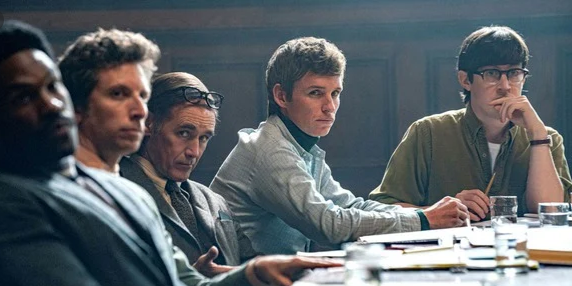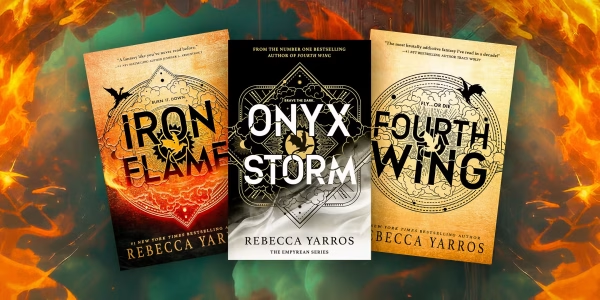Movie Review: “The Trial of The Chicago Seven”

Caption: Three of the Chicago Seven members, as well as Bobby Seale (far left) and the group’s lawyer William Kunstler (middle).
On Oct. 16 2020, Netflix released it’s documentary titled,“The Trial of The Chicago Seven”, which is based on the historic political trial that took place in Chicago in 1969. This monumental trial set the image and courage for other civil rights activists would later follow in their footsteps.
The Chicago Seven started as a group of eight: Abbie Hoffman and Jerry Rubian of the Youth International Party (Yippies), David Dellinger of National Mobilization Committee to End the War in Vietnam (MOBE), Tom Hayden and Rennie Davis of MOBE and Students for a Democratic Society (SDS), John Froines and Lee Weiner, and Bobby Seale of the Black Panthers.
The seven members of the group, not including Bobby Seale, were organizing an anti-war protest that would stand for bringing the troops home from Vietnam. The protest would take place at the National Democratic Convention in Chicago, in efforts to persuade the government to bring the troops home from the war. The demonstration was planned to be full of peaceful protest marches and gatherings, as well as rock concerts that were added thanks to Hoffman and Rubin. However, it was anything but peaceful.
The police and the protesters began battling against one another quickly, which soon turned into a riot that ended with bloodshed and arrests. This outbreak lasted periodically throughout Aug. 25 to Aug. 29. Due to this, the seven members involved were arrested for violating the Title X Law in the Civil Rights Act of 1969, as well as an unlawful protest.
The trial began on Sep. 24 1969, under Judge Julius Hoffman. The press raced to cover the story as the crowd of supporters and protesters gathered outside of the courthouse chanting, “The whole world is watching!”.
Judge Hoffman was known to be a ruthless man, especially when it came to his antipathy towards the Chicago Seven members. All of the members were charged throughout the trial with contempt, which is often charged when a defendant talks or “acts out” during court when warned not toby the judge too many times. However Bobby Seale, the co-founder of the Black Panthers, was the one who was charged the most with contempt, going so far as to being tied up to the chair and gagged before the court. This scene was one of the infamous moments of the trial.
Bobby Seale was however innocent in this trial, due to the fact that he was only in Chicago for a total of four hours and did not participate with the protest nor the planning of the protest. He demanded that he would be tried separately from the other seven, and he eventually got his wish. Seale was sentenced four years in prison due to 16 counts of contempt.
Now with only seven members, the trial went on for a total of five months. Hoffman and Rubin often disrupted the court by reading poetry, making jokes, or sleeping which landed them a 29 month sentence. The other five members were charged with lesser sentences, and eight police officers were charged with civil rights violations.
In the end, Judge Hoffman offered one of the seven members two minutes to speak in an attempt to lessen their sentences, and Hayden was the one who took the stand. He was asked by Judge Hoffman to make his statement respectful, remorseful, and brief. Hayden began speaking stating, “Your honor, since this trial began, 4,752 US troops have been killed in Vietnam, and the following are their names,” then he continued to read out the 4,752 names of the fallen soldiers of the Vietnam war.
This line impacted the entire movie not only by showing what exactly the protest was for, but also for showing that each member stood for passionately. When I hear this line, it makes me think of how strongly the war had impacted society; enough for thousands of people across the country to protest the war to bring the troops home.
The Netflix documentary, directed by Aaron Sorkin, earned a 76% from Metacritic and a 7.9/10 rating from IMBd. The film focused on the actual trial itself, showing flashbacks of the protests as the movie progressed, also including real documented footage from the actual protests and outbreaks.
Movie critic Wendy Ide from The Guardian rated the movie 4/5 stars and states, “…the film feels timely because it is timely. It unfolds on the frontline of a culture war that rages still. For a country that places such value on freedom of speech, America had, and still has, a prickly relationship with dissent.”
This film left me inspired to stand by what I believe in, no matter who tries to stop you, and I felt more educated on the issues that are confronted in the documentary, as well as the issues that are still present today. If you find yourself wanting to watch the educational and inspiring film, you can access this documentary on Netflix.

Ashley is a senior and in her second year of journalism. She is a Staff Writer and Editor. Outside of school, she enjoys reading and writing and will be attending college next fall for journalism. She loves to spend time with family and friends and traveling to new places. She is excited to be back in journalism and is excited to continue her education with journalism in the future.





